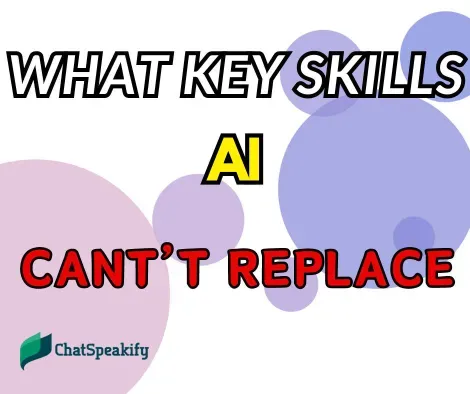As technological advancements continue to skyrocket, many wonder which human skills will remain invaluable and irreplaceable by AI. While AI can process data at unprecedented speeds and even mimic elements of human interaction, some key skills remain firmly rooted in the human experience. Here I share insights into the top five skills that AI cannot replace, grounded in personal anecdotes, expert research, and authoritative sources.
1. Emotional Intelligence (EQ)
Story-Driven Introduction
I remember working with a team on a critical project where tensions were running high. Despite the impending deadline, our team’s productivity was declining owing to stress and misunderstanding. It was a moment of crisis that demanded more than just technical know-how—it required emotional intelligence.
Expert Insight
Emotional Intelligence (EQ) is the capacity to comprehend and control your own and other people’s emotions. According to Daniel Goleman, the psychologist who popularized the notion of emotional intelligence (EQ), this capacity is critical for effective leadership, teamwork, and conflict resolution.
Why AI Can’t Replace It
AI can evaluate emotions using data patterns, but it lacks true empathy, which is essential for developing strong human bonds and trust. AI systems can detect when someone is distressed, but they cannot soothe them or give the nuanced assistance that humans can.
2. Creative Thinking
Experience-Based Example
During a brainstorming session for a new marketing campaign, I realized that the out-of-the-box ideas that pushed the boundaries came from my colleagues’ diverse perspectives and experiences. AI can generate content, but it’s rooted in existing data and patterns.
Studies and Research
According to a study by the World Economic Forum, creativity is one of the top skills needed for the future workforce. Creative thinking involves forming new ideas and thinking beyond conventional limitations, something AI, rooted in logic and data, finds challenging.
Why AI Can’t Replace It
Creativity stems from human consciousness and our ability to make unique connections between unrelated ideas. AI can assist in the creative process but cannot independently originate truly novel ideas.
3. Complex Problem-Solving
Personal Anecdote
I recall a complex project in which we faced an ambiguous problem that required deep critical thinking and collaboration. The solution wasn’t apparent, and it took multiple brainstorming sessions, debates, and iterations to find the right one.
Authoritative Sources
The Harvard Business Review emphasizes that complex problem-solving involves many cognitive processes, including critical thinking, which requires human intuition and innovation.
Why AI Can’t Replace It
AI excels in solving problems with clear parameters and abundant data. However, in situations requiring holistic understanding, intuitive leaps, and ethical considerations, human judgment trumps algorithmic precision.
4. Independent Critical Thinking
Memorable Experience
In university, I was part of a debate team where we often tackled controversial topics. Critical thinking was not just useful but essential. It required us to assess arguments, identify logical fallacies, and synthesize information from multiple sources to build compelling cases. This level of independent critical thinking shaped my ability to make reasoned judgments.
Academic Support
According to Dr. Linda Elder and Dr. Richard Paul, leaders in critical thinking studies, this skill involves analyzing and evaluating reasoning and evidence, figuring out the best explanations, and forming judgments. It’s a reflective and metacognitive process that AI simply cannot replicate.
Why AI Can’t Replace It
AI can present facts and data, but it cannot independently assess them with the depth of understanding that humans can, especially when dealing with abstract concepts and ethical dilemmas requiring nuanced judgment. Critical thinking also involves the ability to self-correct and challenge assumptions, a trait AI is unable to embody without explicit programming.
5. Interpersonal Communication
Real-Life Story
My role often requires negotiating with clients and stakeholders. Building relationships involves much more than just exchanging information; it requires understanding cultural contexts, reading body language, and navigating social nuances.
Expert Opinion
Dr. Albert Mehrabian, a psychologist known for his work on the importance of verbal and non-verbal communication, estimates that words account for only 7% of a message’s meaning, while tone and body language make up the rest.
Why AI Can’t Replace It
Though AI can process and respond to language, it lacks the depth of understanding needed for genuine interpersonal communication. Human interaction is built on subtleties and unspoken cues that AI cannot fully grasp.
6. Ethical Judgment and Morality
Memorable Moment
As part of a panel discussing the ethical use of emerging technologies, the debate often veered into grey areas where clear-cut answers were elusive. These situations required reflection on moral principles and societal values.
Research Insight
The MIT Media Lab’s research on ethics and technology indicates that making ethical decisions involves a complex interweaving of cultural, emotional, and social factors that AI isn’t equipped to handle independently.
Why AI Can’t Replace It
AI operates within the parameters set by human programming and data input. Ethical judgment requires a nuanced understanding of right and wrong, often considering the broader impact on society—a trait inherent to human beings.
Encouraging Conclusion
Human skills grounded in emotional intelligence, creativity, complex problem-solving, independent critical thinking, interpersonal communication, and ethical judgment remain irreplaceable. While AI can augment our abilities and handle specific tasks efficiently, these uniquely human capacities ensure that we retain our irreplaceable roles in an increasingly digital world. So, as you navigate the evolving landscape, take pride in cultivating these skills—embrace your human essence.
Happy writing, and may your words always reflect the depth and complexity that only a human touch can impart.
References
Goleman, Daniel. “Emotional Intelligence: Why It Can Matter More Than IQ.” Bantam Books, 1995.
World Economic Forum. “The Future of Jobs Report 2020.” weforum.org
The Neurological Components Involved in Creative Thinking," Harvard Business Review.
Mehrabian, Albert. “Nonverbal Communication.” Aldine Transaction, 2007.
MIT Media Lab. “Ethics and Governance of Artificial Intelligence.” media.mit.edu
Elder, Linda, and Richard Paul. “Critical Thinking: Learn the Tools the Best Thinkers Use.” Pearson, 2012.
By keeping these skills sharp, you ensure that your contributions stand the test of time, irrespective of advancing technologies.
